Gwent Game
On June 15, 2016 CDProject anounced the development of a stand-alone Gwent: The Witcher Card Game. GWENT will be available at release for Xbox One, PC and PlayStation 4, GWENT is a free to play game that puts you, not your cards, in the center of the action. [1]
Card game Invented by dwarves and perfected over centuries of tavern table play, Gwent is a game of initial simplicity and ultimate depth, something beloved by both road-weary travellers during long nights around the campfire and elegant nobles looking to liven up dragging dinner parties.
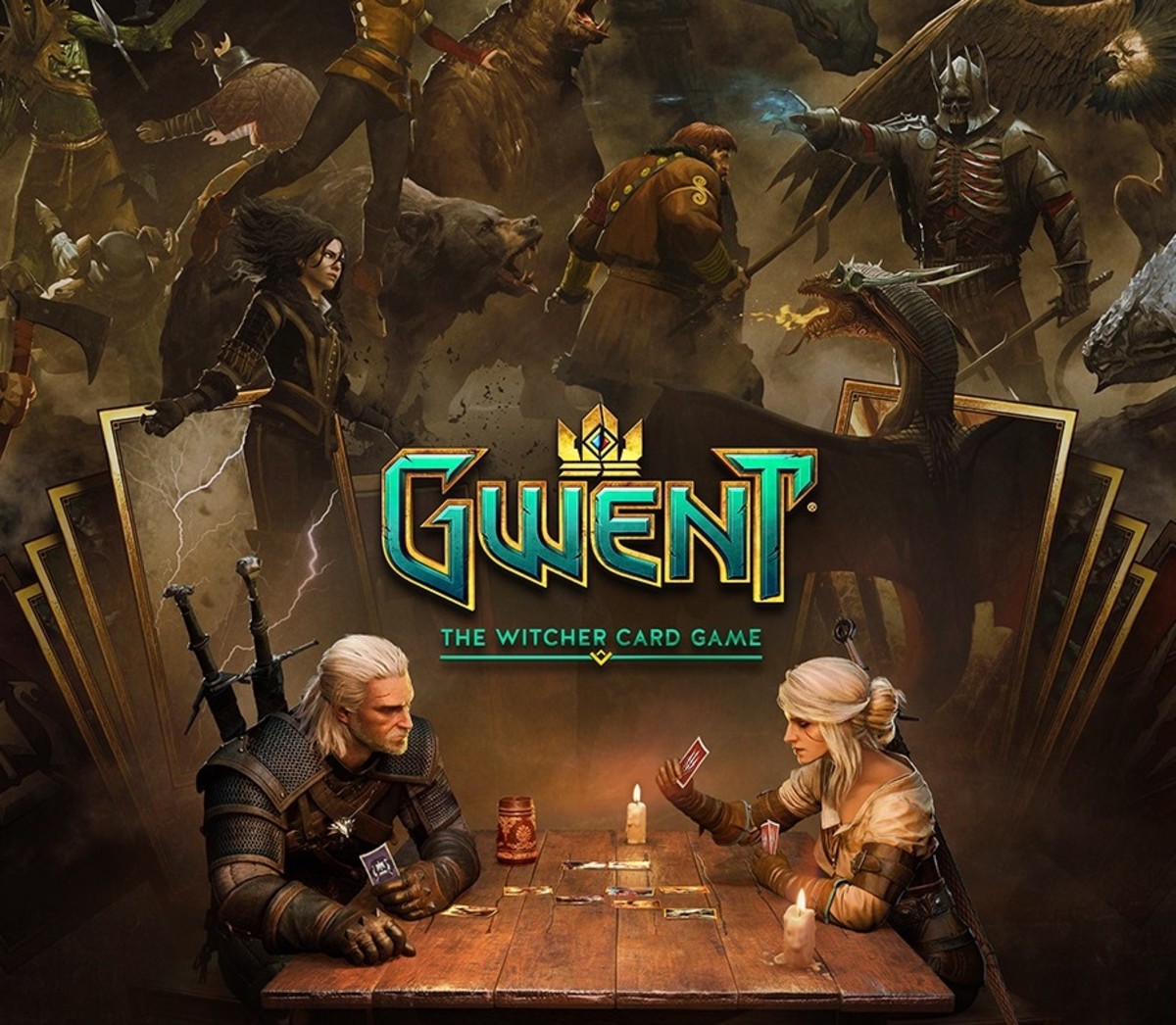
| “ | Gwent is a fast-paced card game that can be played within The Witcher 3: Wild Hunt on every platform. Invented by dwarves and perfected over centuries of tavern table play, Gwent is a game of initial simplicity and ultimate depth, something beloved by both road-weary travelers during long nights around the campfire and elegant nobles looking to liven up dragging dinner parties. The game is about the clash of two armies locked in mortal struggle on a battlefield where the players are the leaders and the cards their forces. With four different factions offering unique combat styles and endless paths to victory, Gwent is every adventurer’s first choice when it comes to one-on-one card-based dueling. Take risks and think on your feet, strategize and deliver cunning combos, use potent magic and mighty hero cards and be the last one standing on the field of honor! | „ |
| ~ thewitcher.com News, introducing the game |
It went on to spawn two independent computer games: Gwent: The Witcher Card Game and Thronebreaker: The Witcher Tales.
The Witcher Adventure Game is a digital adaptation of CD PROJEKT RED’s board game set in the brutal fantasy universe of monster slayer Geralt of Rivia. Travel across the beautifully rendered world of The Witcher and complete a variety of quests — hunt deadly beasts, solve ancient mysteries and more. The Witcher Adventure Game is a digital adaptation of CD PROJEKT RED’s board game set in the brutal fantasy universe of monster slayer Geralt of Rivia. Travel across the beautifully rendered world of The Witcher and complete a variety of quests — hunt deadly beasts, solve ancient mysteries and more. GWENT is a representation of armies clashing on the battlefields of The Witcher universe, where players are the commanders, and cards are their forces. Players compete in fast past duels which consist of skill-based gameplay, and careful deck construction.
- 2Gwent Rules
Decks
Gwent is an ancient dwarven game that simulates the clash of two armies in battle. The players are generals, and the cards are their forces. Gwent players use their own customized decks. You can build your decks in the color of the five Factions - Nilfgaard, Northern Realms, Monsters, Skellige and Scoia'tael. Each Faction features a number of unique cards that encourage a different style of play. Each Faction also has a faction perk:
- Monsters - Keeps a random Unit Card on the battlefield after each round.
- Nilfgaardian Empire - Wins any round that ends in a draw.
- Northern Realms - Grants an extra card after every victorious round.
- Scoia'tael - Decides who takes the first turn of a battle.
- Skellige - 2 random Unit cards from the graveyard are placed on the battlefield at the start of the third round.
Gwent Rules
Creating a deck
- A deck must consist of at least 25 cards
- There is an upper limit of 40 cards, but doing so reduces the chances of drawing the most powerful cards. However, this is not a general rule, as Monsters and Scoia'Tael decks benefit from a large size due to the prevalence of cards that spawn their duplicates onto the field automatically.
Playing the game
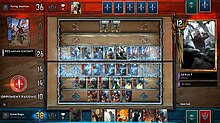
- At the beginning of each round, both players draw ten cards from their decks, on top of their Leader card.
- After drawing the cards, you can swap out three cards from your hand - or press Escape to skip this step if you're satisfied with the cards you have. Note that you will not draw any more cards during the round, unless you play a card that states otherwise.
- The objective is to win two rounds from three - and preventing the opponent from doing the same. A round is won when your score is higher than your opponent's after both player passed. A tie will count as a won round to both player.
- A round ends when both players pass. A player will pass automatically if they run out of cards. Once the round ends and the winner is decided, the battlefield is cleared and the score resets to zero.
- There are three types of unit cards in the game: Melee, Ranged, and Siege. The fourth are special cards. Special cards are discarded after they're played, while units are placed on the game board in the appropriate row.
- Certain unit cards have special abilities, which allow you to draw additional cards, return discarded units to the battlefield, increase the point value of other cards in the row, destroy enemy units in the opposing row, and more. These can turn around the game - mastering them is essential.
- Special cards are essentially spells. Weather cards reduce the strength of ALL cards of a given type on the battlefield, including your own, while others allow you to destroy powerful units or return those on your side of the battlefield to your hand.
- Leader cards offer a special ability that can be used once per play. In some cases, this can be vital - on other, it can be used to effectively skip a turn.
Winning the game
- The strategy for winning the game will greatly depend on the deck and your hand. However, there is a number of tricks that stay true regardless of which type of deck you play. The primary one is that you play to outlast the enemy. While winning a round by going all-in looks impressive, if your opponent still has two or three cards left in their hand, you are likely going to lose the next one and then the game.
- As such, any action that places cards in your hand is advantageous. Northern Kingdoms and Nilfgaardian Empire decks are built around this concept, with multiple cards with the Espionage ability. While they do add to the enemy score when played, the two additional cards you draw usually compensate for this inconvenience. Monsters and Scoia'Tael decks are more problematic - they have to rely on the opponent playing these cards and then re-using them using the Decoy special card.
- Spying units are best played when the opponent cannot react - such as after they have passed their turn. You also should keep in mind that though the general rule is 'the bigger strength of your card the better', in case of espionage units quite the opposite is true. Since it counts for your opponent, the less its strength - the better. So best espionage units have little strength (e.g. Thaler has 'just' 1 strength), and the worse ones are huge (e.g. Stefan Skellen has 9). Also when you play espionage cards: either uphold tactics to lose early round (to get more cards to win later) or have at your disposal weather cards that will mitigate their negative influence to one. Of course in this case you should keep the row that you want to deteriorate from your part relatively clean from units.
- Weather cards are particularly useful in disabling entire rows - not just to reduce your opponent's score, but to temporarily debuff your own units to protect against the Scorch card. This is particularly useful for the Northern Kingdoms, with their powerful Siege units.
- If a unit with a special ability is discarded, then returned to the game, its ability will activate again. The one exception is Brotherhood, which only pulls cards onto the battlefield the first time it's played.
- A useful strategy is to allow the opponent to win a single round. Win the first round, play for time in the second, then smash them in the third. Alternatively, play for a tie, then smash them in the second round. Though when playing for the Northern Kingdoms it is often more useful to go 'all in' in order to win the first round, because then you'll have one more free card for winning this round (special feature) and then spent all that rest to win the second round and thus the game.
Video
| Gwent: The Witcher Card Game | |
|---|---|
| Developer(s) | CD Projekt Red |
| Publisher(s) | CD Projekt |
| Director(s) | Benjamin Lee[1] Katarzyna Redesiuk[2] |
| Designer(s) | |
| Composer(s) |
|
| Series | The Witcher |
| Engine | Unity |
| Platform(s) |
|
| Release |
|
| Genre(s) | Collectible card game |
| Mode(s) | Single-player, multiplayer |
Gwent: The Witcher Card Game[b] is a free-to-playdigital collectible card game developed and published by CD Projekt for Microsoft Windows, PlayStation 4,[a] and Xbox One[a] in 2018, for iOS in 2019, and for Android in 2020. The game is derived from the card game of the same name featured in Andrzej Sapkowski's The Witcher novels and playable in The Witcher 3: Wild Hunt video game.
Gameplay[edit]
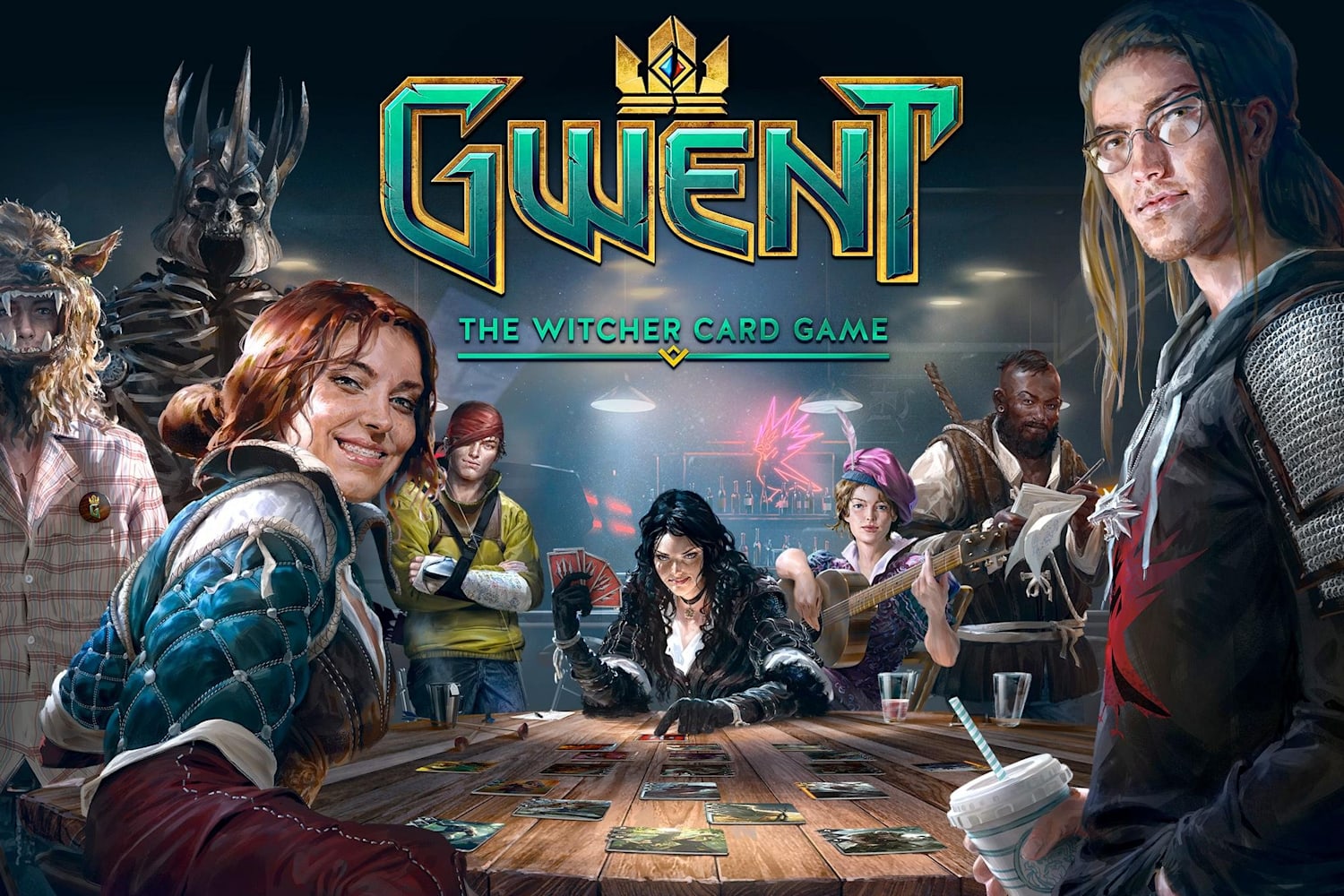
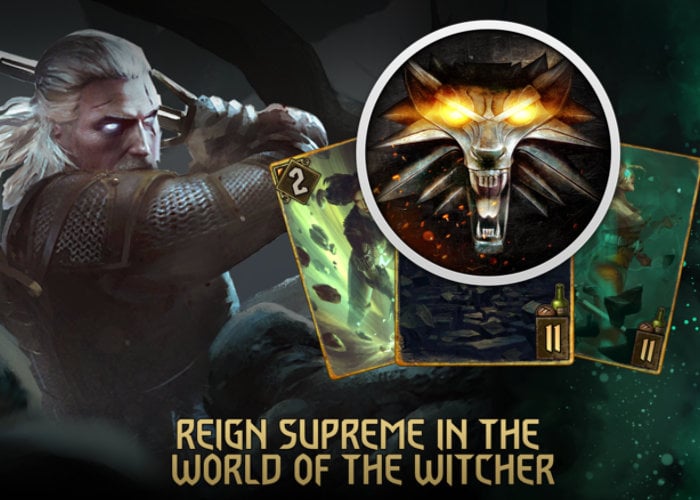
Gwent is a turn-based card game between two players, with each game taking three rounds. Each player must play one card each turn from a deck of at least twenty-five cards. Each deck belongs to a faction that offers different play styles. Each faction has different 'leaders' who each have individual abilities. As Gwent does not use a mana system like most traditional CCGs, card advantage is often what wins the game.
The Homecoming Update,[6] which was released in conjunction with Thronebreaker: The Witcher Tales, changed the game in a number of ways. The leader is no longer a playable card; it now gives the player an ability, and dictates how many mulligans are available to the player throughout the course of a match. The limits on how many gold and silver cards can be in a deck has been removed. Deckbuilding now uses a Recruit Cost system. Decks have a Recruit Cap of 165, with each card in the game having a Recruit Cost associated with it. The update also removed the siege row from the play area, leaving only the melee row and the ranged row. A new card type, artifacts, was added to the game. These do not contribute points to your side of the board but offer varying abilities.
The goal is to win two of three rounds by playing cards and spells to gain points called 'power' on the board. A player wins a round by having more points on board than their opponent. Rounds end when either both players pass to the next round, or when both players run out of cards. The first to win two out of three rounds wins the game.
Round wins go toward daily rewards, awarding players with card packs known as 'kegs,' scraps, meteorite dust, or ore. Players can gain additional cards by buying kegs with ore or through microtransactions; each keg contains five cards, with the upside that the fifth is rarer than the rest and a choice between three is offered. Cards can also be crafted with scraps. Premium versions of cards can be crafted with meteorite dust. Ore is used to buy kegs.
The game features several modes of gameplay. The standard Casual Play mode allows players to challenge one another, whereas in Rank Play players compete in order to increase in a tier-ladder system. Ranked takes place across a month-long season, where players aim to increase in rank to increase end-of-season rewards. Player ranks do not degrade once earned, and work on a numerical system from 1-21, before entering into the top 1,000. Players are also assigned a matchmaking rating, which respectively increases or decreases as a player wins and loses games. Gwent has also had multiple seasonal events, inviting players to take part in themed events with premade decks. These events functioned like puzzles, where exact moves had to be made to win. Seasonal events normally award a player profile picture, border as well as a title.
It featured cross-platform play between the PC and console versions, although platform play between the console versions was not supported.[7][8]
Arena Mode[edit]
Arena Mode functions as a draft mode, where players must build a deck from random cards. The player will pick one of four cards of identical rarity randomly shown. Twenty-six cards are drafted, and then a leader is chosen from 3 randomly shown leaders. The cards shown are from a pool of all cards, meaning decks can contain cards from all factions. There is no limit on how many gold cards or silver cards can be in the deck, and any number of duplicates can be drafted.
Arena Mode is themed around The Witcher 3: Wild Hunt character Gaunter O'Dimm [ru], who offers contracts in the arena in exchange for rewards. A maximum of nine wins will award players with a gold card, as well as other rewards including ore, scraps and/or meteorite dust. The arena will guarantee players at least one keg as a reward, even with no contracts completed. Players have three lives and lose a life when a game is lost. The arena run will end when either a player quits and breaks the contact, when all three lives are lost, or when all nine wins are achieved.
Gwent Game Guide
There are also periodic 'special event' arena modes occasionally available. These have unique drafting rules, such as the Gold Rush, where all cards drafted are Gold cards or Law of the Jungle, where all cards drafted are from the Monsters faction. The special events generally last 1 week, and the regular arena mode is also available to play during the event.
Thronebreaker[edit]
Combat in the video game Thronebreaker: The Witcher Tales is in the form of a card-battle game similar to Gwent, but slightly different.
Development and release[edit]
The game had an estimated 100 staff members working on it.[9] Following an open beta release in May 2017, it was officially released for Windows in October 2018, and was released for PlayStation 4 and Xbox One on December 4, 2018. A standalone, single-player campaign mode, Thronebreaker: The Witcher Tales, was also released alongside Gwent.[10]
In March 2019, CD Projekt Red announced that Gwent would be launching on mobile devices later that year. Jason Slama, the game's director, said that the team's vision for bringing the game to them combined the best they had to offer both in terms of 'graphics and gameplay'.[11] It released for iOS on October 29, 2019[12] and Android on March 24, 2020.[13]
Support for the PlayStation 4 and Xbox One versions of the game was ended in June 2020.[5]
Reception[edit]
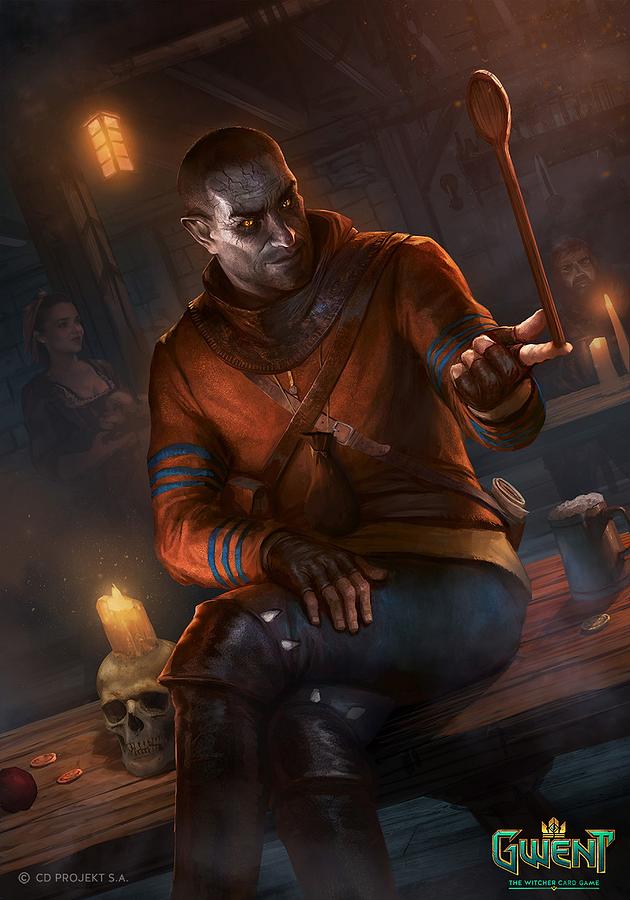
| Aggregator | Score |
|---|---|
| Metacritic | PC: 80/100[14] |
Gwent was nominated for 'Most Promising New eSports Game' at the 2019 SXSW Gaming Awards[15] and for 'Best Polish Game Art' at the 2019 Digital Dragons Awards.[16]
Notes[edit]
Gwent Game Modes
- ^ abcdeSupport discontinued in June 2020[5]
- ^Gwint: Wiedźmińska Gra Karciana in Polish
References[edit]
Gwent Game Review
- ^'GWENT preview refined multiplayer'. pcgamer.com. Retrieved 28 October 2016.
- ^'GWENT Homecoming — see what's next for GWENT'. playgwent.com. Retrieved 14 April 2018.
- ^'Gwent's cards: testing the limits of crazy'. Venture Beat. Retrieved 2 September 2018.
- ^Fenlon, Wes (17 June 2016). 'How Gwent became a competitive card game with singleplayer campaigns'. PCGamer. Retrieved 18 June 2016.
- ^ ab'[UPDATE] IMPORTANT ANNOUNCEMENT ABOUT THE FUTURE OF GWENT ON CONSOLES'. GWENT: The Witcher Card Game. 4 December 2019. Retrieved 28 July 2020.
- ^ ab'GWENT: The Witcher Card Game'. Retrieved 25 October 2018.
- ^Sanchez, Miranda; Davis, Justin (13 June 2016). 'E3 2016: Gwent: The Witcher Card Game Announced'. IGN. Ziff Davis. Retrieved 13 June 2016.
- ^Gwent: The Witcher Card Game - FAQ, playgwent.com, June 6, 2017.
- ^Schreier, Jason (18 June 2018). 'Why Cyberpunk 2077 Is Taking So Long'. Kotaku. Archived from the original on 19 June 2018. Retrieved 24 June 2018.
- ^Purchese, Robert (18 September 2018). 'CD Projekt Red dates full Gwent: The Witcher Card Game release, and standalone Thronebreaker adventure'. Eurogamer. Retrieved 18 September 2018.
- ^Broadwell, Joshua (27 March 2019). 'GWENT: The Witcher Card Game Coming to Mobile Later This Year'. GameSkinny. Retrieved 27 March 2019.
- ^Wald, Heather. 'Gwent iOS has officially launched, so you can take the Witcher card game anywhere'. GamesRadar+. Retrieved 5 November 2019.
- ^'GWENT is live on Android! Download now on Google Play!'. GWENT: The Witcher Card Game. Retrieved 2020-03-27.
- ^'Gwent: The Witcher Card Game for PC Reviews'. Metacritic. CBS Interactive. Retrieved 6 March 2020.
- ^Trent, Logan (11 February 2019). 'Here Are Your 2019 SXSW Gaming Awards Finalists!'. South by Southwest. Retrieved 16 February 2019.
- ^Werner, Adrian (8 April 2019). 'Nominacje do Digital Dragons Awards - Frostpunk i Thronebreaker liderami'. GRY-Online.pl. Retrieved 14 April 2019.



